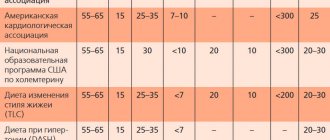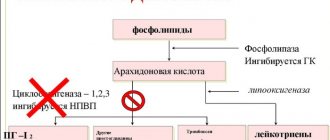Nimesil granules for the preparation of suspension for oral administration 100 mg sachets 9 pcs. in Moscow
Undesirable side effects can be minimized by using the minimum effective dose of the drug for the shortest possible short course.
Nimesil should be used with caution in patients with a history of gastrointestinal diseases (ulcerative colitis, Crohn's disease), since exacerbation of these diseases is possible.
The risk of gastrointestinal bleeding, ulceration or perforation of an ulcer increases with increasing dose of NSAIDs in patients with a history of ulcers, especially those complicated by bleeding or perforation, and in elderly patients, so treatment should be started with the lowest possible dose. Patients receiving drugs that reduce blood clotting or inhibit platelet aggregation also have an increased risk of gastrointestinal bleeding. If gastrointestinal bleeding or ulcers occur in patients taking Nimesil, treatment with the drug should be discontinued.
Since Nimesil is partially excreted by the kidneys, its dosage for patients with impaired renal function should be reduced, depending on the level of urination.
There is evidence of rare cases of liver reactions. If signs of liver damage appear (itching, yellowing of the skin, nausea, vomiting, abdominal pain, dark urine, increased activity of liver transaminases), you should stop taking the drug and consult your doctor.
Despite the rarity of visual impairment in patients taking nimesulide concomitantly with other NSAIDs, treatment should be stopped immediately. If any visual disturbance occurs, the patient should be examined by an ophthalmologist.
The drug can cause fluid retention in tissues, so patients with high blood pressure and cardiac problems should use Nimesil with extreme caution.
In patients with renal or heart failure, Nimesil should be used with caution, as renal function may deteriorate. If the condition worsens, treatment with Nimesil should be stopped.
Clinical studies and epidemiological data suggest that NSAIDs, especially at high doses and with long-term use, may lead to a small risk of myocardial infarction or stroke. There is insufficient data to exclude the risk of such events when using nimesulide.
The drug contains sucrose, this should be taken into account by patients suffering from diabetes mellitus (0.15-0.18 XE per 100 mg of the drug) and those on a low-calorie diet. Nimesil is not recommended for use in patients with rare hereditary diseases of fructose intolerance, glucose-galactose malabsorption or sucrose-isomaltose deficiency.
If signs of a “cold” or acute respiratory viral infection occur during treatment with Nimesil, the drug should be discontinued.
Nimesil should not be used simultaneously with other NSAIDs.
Nimesulide can change the properties of platelets, so caution must be exercised when using the drug in people with hemorrhagic diathesis, however, the drug does not replace the preventive effect of acetylsalicylic acid in cardiovascular diseases.
Elderly patients are especially susceptible to adverse reactions to NSAIDs, including life-threatening gastrointestinal bleeding and perforation, deterioration of renal, liver and cardiac function. When taking the drug Nimesil for this category of patients, proper clinical monitoring is necessary.
Like other drugs of the NSAID class that inhibit prostaglandin synthesis, nimesulide can adversely affect pregnancy and/or embryo development and can lead to premature closure of the ductus arteriosus, hypertension in the pulmonary artery system, impaired renal function, which can lead to renal failure with oligodyramnia, to an increased risk of bleeding, decreased uterine contractility, and the occurrence of peripheral edema. In this regard, nimesulide is contraindicated during pregnancy and lactation. The use of the drug Nimesil can negatively affect female fertility and is not recommended for women planning pregnancy. When planning a pregnancy, consultation with your doctor is necessary.
There is evidence of the occurrence in rare cases of skin reactions (such as exfoliative dermatitis, Stevens-Johnson syndrome, toxic epidermal necrolysis) to nimesulide as well as to other NSAIDs. At the first signs of a skin rash, damage to the mucous membranes or other signs of an allergic reaction, Nimesil should be discontinued.
The effect of the drug on the ability to drive vehicles and operate machinery.
The effect of the drug Nimesil on the ability to drive vehicles and operate machinery has not been studied, therefore, during treatment with the drug Nimesil, caution should be exercised when driving vehicles and engaging in potentially hazardous activities that require increased concentration and speed of psychomotor reactions.
Contraindications
- history of hepatotoxic reactions caused by the active substance;
- bronchospasm, urticaria, rhinitis associated with the use of acetylsalicylic acid or other non-steroidal anti-inflammatory drugs in the anamnesis;
- concomitant use of drugs with potential hepatotoxicity;
- condition after coronary artery bypass surgery;
- inflammatory bowel diseases (ulcerative colitis, Crohn's disease) in the acute stage;
- increased body temperature in infectious and inflammatory diseases;
- exacerbation of a peptic ulcer, a history of ulcers, perforation or bleeding in the digestive tract;
- a combination of bronchial asthma, nasal polyposis and intolerance to non-steroidal anti-inflammatory drugs;
- bleeding of cerebrovascular or other localizations; diseases accompanied by pathological bleeding;
- decompensated heart failure;
- severe blood clotting disorders;
- decompensated renal failure, hyperkalemia;
- liver diseases;
- liver failure;
- alcoholism, drug addiction;
- pregnancy or lactation;
- age under 12 years;
- hypersensitivity to the components of the drug.
The decision to prescribe the drug Nimesil remains with the attending physician.
Analogues of the drug Nimesil
Analogs
In pharmacies you can find quite a large number of Nimesil analogues. The active ingredient of the drug - nimesulide - is superior in action to popular drugs from the NSAID group (Ibuprofen, Diclofenac). However, similar substances in the composition do not guarantee the same effect as Nimesil. That is why there is no need to self-medicate - consult a specialist.
- Nise is an effective pain reliever and an analogue of Nimesil. The main difference is that Nise is available in the form of a topical gel and tablets;
- Nimesulide and Nemulex - the medicine is not inferior to Nimesil in terms of effect strength, but costs less;
- Aponil is related to NSAIDs and has a pronounced anti-inflammatory effect, but weaker than Nimesil;
- Nimulid - the medicine is produced in several forms: tablets, suspension, injection solution, gel;
- Prolide - the product is available in the form of fast-acting tablets. Compared to Nimesil, it has fewer side effects.
Also, the pharmaceutical market is ready to offer: Ameolin (tablets), Affida Fort (granules for preparing a suspension), Nigan (tablets), Nimegesic (tablets, suspension), Nimesin (tablets), Nimegesic (tablets, granules), Nimujet (injection solution), Nimujet (tablets), Pansulide (tablets), Remesulide (tablets), Sulidin (gel), Taro-Sanovel (tablets).
The use of analogues should be agreed with the attending physician.
Nimesil and alcohol
Nimesil and alcohol are incompatible; taking them together is strictly prohibited. Why? Both alcoholic drinks and Nimesil reinforce each other and are hepatoxic, that is, they affect the liver and can lead to severe disorders of its functioning: the development of granuloma, acute hepatitis and cirrhosis. Also, the combination of the drug and alcohol provokes fluid retention in the body and high blood pressure. The functioning of the gastrointestinal tract is also disrupted. Alcohol irritates the gastric mucosa, causing gastritis and ulcers. Internal bleeding may occur as a result of perforation of the wall of the stomach and intestines.
Do not take Nimesil with alcohol
They try not to prescribe Nimesil to patients with pathologies of the cardiovascular system and blood. Ethyl alcohol causes vasospasm, which increases the load on the heart, and simultaneous use of the drug can lead to acute heart failure or death. For patients who suffer from alcohol addiction, Nimesil is contraindicated, since the body is weakened, the risk of complications increases significantly. Also, the suspension is not recommended to be taken during a hangover.
How to take Nimesil?
Nimesil is sold in pharmacies in powder form, from which a suspension is prepared immediately before administration. So, Nimesil is taken orally, 1 sachet (100 mg of the active substance nimesulide) 2 times a day. It is recommended to take the drug after meals. The contents of the sachet are poured into a glass and dissolved in approximately 100 ml of warm boiled water. The prepared solution cannot be stored. The interval between doses of the drug is at least 12 hours. It is prohibited to increase the dosage.
Nimesil should be taken after meals with a glass of water.
You should remember some instructions when calculating the dosage and use of the drug Nimesil.
- The maximum duration of treatment is 15 days. To reduce the risk of adverse reactions, it is recommended to use the minimum effective dose for the shortest possible period of time.
- For adolescents (ages 12 to 18 years), there is no need to change the dosage.
- In case of impaired renal function, there are no indications for dose adjustment in mild to moderate forms of renal failure (creatinine clearance 30-80 ml/min).
- When treating elderly people, the need to adjust the daily dose is determined by the doctor based on the possibility of interaction with other drugs.
As for toothache, diluting Nimesil granules is exactly the same as described above. After about 20 minutes you can feel relief. Since Nimesil effectively suppresses the inflammatory process in tissues (including lowering the temperature), it is drunk for pain, gumboil and other inflammatory diseases of the oral cavity. But it should be remembered that the drug only relieves pain, but does not cure the disease. Therefore, you should not put off visiting the dentist.
Adverse reactions
Side effect of the drug is visual disturbances
Like any medicine, Nimesil may have side effects:
- allergic reactions - sweating, rash, itching, erythema, anaphylactoid reactions, dermatitis, urticaria, erythema multiforme, angioedema, Stevens-Johnson syndrome, Lyell's syndrome;
- hematopoietic disorders - eosinophilia, pacitopenia, anemia, thrombocytopenia, hemorrhagic syndrome, thrombocytopenic purpura;
- visual disturbances – blurred vision;
- disorders of nervous activity - feelings of fear, dizziness, headache, nightmares, drowsiness, nervousness, encephalopathy;
- circulatory disorders - hot flashes, tachycardia, arterial hypertension, sudden changes in blood pressure;
- digestive system disorders - nausea, diarrhea, vomiting, flatulence, constipation, abdominal pain, gastritis, dyspepsia, tarry stools, stomatitis, bleeding from the digestive tract, gastric perforation or ulcer, duodenal perforation or ulcer, hepatitis, cholestasis, jaundice, increased levels of liver enzymes;
- breathing disorders - shortness of breath, attacks of bronchial asthma;
- general disorders – asthenia, general malaise, hypothermia;
- disorders of the genitourinary system - renal failure, hematuria, urinary retention, dysuria, oliguria, interstitial nephritis;
- other disorders – hyperkalemia is possible.
Precautionary measures
Carefully
Arterial hypertension, diabetes mellitus, compensated heart failure, coronary heart disease, cerebrovascular diseases, dyslipidemia/hyperlipidemia, peripheral arterial disease, hemorrhagic diathesis, smoking, creatinine clearance 30-60 ml/min.
History of ulcerative lesions of the gastrointestinal tract; history of infection caused by Helicobacter pylori; elderly age; long-term previous use of NSAIDs; severe somatic diseases.
Concomitant use with the following drugs: anticoagulants (for example, warfarin), antiplatelet agents (for example, acetylsalicylic acid, clopidogrel), oral glucocorticosteroids (for example, prednisolone), selective serotonin reuptake inhibitors (for example, citalopram, fluoxetine, paroxetine, sertraline).

